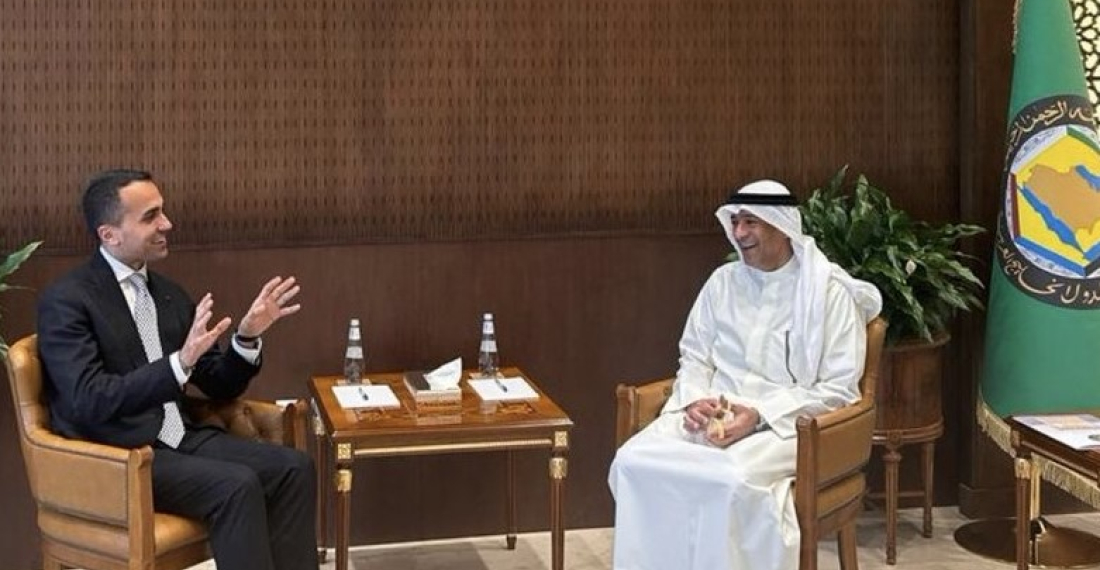European Union diplomacy is often criticised for not giving enough attention to the countries of the Gulf Co-operation Council (GCC). In a signal that things are about to change, in June it appointed its first Special Representative for the region. The EU has a number of these Special Representatives, know as EUSRs, usually dealing with regions or topics that cannot be addressed through the bilateral delegations that the EU has in most countries of the world. But the announcement that the EU was going to appoint former Italian Prime Minister, Luigi Di Maio, as its first EUSR for the Gulf countries came as a bit of a surprise. Too senior, some said; too much political baggage from his time in Italian politics, said others.
But after a brief moment of hesitation the 27 member states finally agreed Di Maio's candidature.
This week he finally arrived in the Gulf on his first visit in this role.
Di Maio's meetings on his first day in Riyadh, about summarised the waters he will have to navigate.
Di Maio began his Riyadh visit with a meeting with Jasem Albudaiwi, secretary-general of the GCC, the EU's natural partner in the Gulf. The two discussed “advanced preparations for a fruitful upcoming EU-GCC Council on October 10 (in Oman) — a key milestone for implementing our strategic partnership”, it was stated afterwards.
The second tier of Di Maio's remit is the relationship with the individual Gulf states. In Riyadh this week he met Waleed A. Elkhereiji, the vice minister of foreign affairs. In many other contexts EUSRs when visiting the region of their responsibility often meet the foreign ministers, and in some contexts, even the Heads of State, and it is too early to say if the Saudis have decided that Di Maio's access be limited to deputy Foreign Minister level. Whilst this may seem a protocol issue, it can also be a signal of how the Saudis place their relationship with the EU.
Finally, Di Maio also spent time meeting the other European representatives in Riyad, both those representing the EU, and the Ambassadors of the 17 member states. EUSRs often have to finely balance keeping their European counterparts engaged and supportive, whilst pushing forward the wider agenda that an EUSR's role is supposed to hold. They would not call them "Special" representatives if such agendas did not exist.
Di Maio did well on his first visit to give an extensive interview to the Saudi daily, Arab News, where he outlined the EU's vision of relations with the region. He told the newspaper:
“I think that the world is changing and there are new partnerships to build,” Di Maio said during an interview on Thursday that touched on topics ranging from the Russia-Ukraine conflict to the economic empowerment of women and young people in the Kingdom.
“There are old partnerships that we built during the last decades. But we are in a period where everything is changing, because of the terrible Russian aggression against Ukraine, because of the pandemic.
“And you (Saudi Arabia and the Gulf states) are taking some initiatives in the region that are very interesting for us and are very welcoming if they are oriented to de-escalation. So, I think that it’s not a question of ignoring or considering, but we have to work together.”
You can read the interview on the Arab News website, here
Di Maio has five more countries to visit, including Bahrain, Kuwait, Qatar., Oman and United Arab Emirates. He will do well to understand the nuanced differences between these countries, as well as those things that unite them. But even more importantly the key for future EU engagement in the Gulf lays in the process of change ongoing in the region, particularly as regards the role of women and youth in society. Here the EU has much to offer if it is able to approach the region with an open mind, and to give its people the respect they deserve.
source: This commentary was prepared by the editorial team of commonspace.eu
photo: EU Special Envou for the Gulf Region, Luigi Di Maio, met on Thursday in Riyad with the Secretary General of the Gulf Co-operation Council







